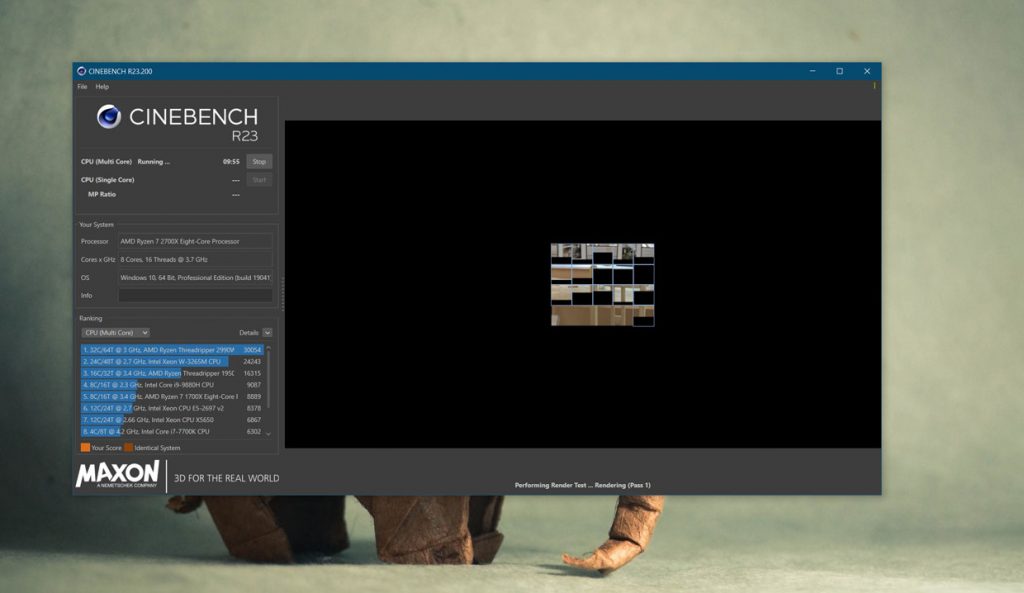Maxon a récemment publié Cinebench R23. Cette mise à jour du célèbre benchmark est censée mieux refléter les performances sous Cinema 4D. Elle apporte de nombreuses améliorations dont la prise en charge du nouveau processeur M1 d’Apple.
Le benchmak évolue et s’adapte aux dernières technologies afin de proposer un indice de performance plus réaliste. Les changements apportés sont importants au point qu’ils réduisent les scores. Il n’est donc pas possible de comparer les résultats avec ceux des versions précédentes, y compris Cinebench R20. Par exemple un temps d’exécution minimum de 10 minutes est assurer pour éviter les boosts artificiels en s’assurer que les systèmes atteignent leurs températures maximales.
Maxon explique
“Cinebench est un test multi-plateformes en conditions réelles, qui évalue les capacités matérielles de votre ordinateur. Les améliorations de Cinebench Release 23 concernent notamment la prise en charge des récentes évolutions au niveau des processeurs et des technologies de rendu, permettant ainsi d’évaluer de façon plus pertinente la capacité de Cinema 4D à tirer parti des nombreux cœurs et des nouvelles fonctionnalités des processeurs les plus récents. Et pour couronner le tout : il est gratuit ! »
Toute personne souhaitant évaluer des performances matérielles fera de Maxon Cinebench un outil incontournable de son arsenal de tests. Les administrateurs système utilisent généralement Cinebench comme une aide à la décision d’achat de matériel, les journalistes font fréquemment appel à Cinebench lors de tests de matériels, les joueurs évaluent et comparent la puissance de leur machine, et les fondeurs peuvent utiliser les résultats obtenus pour optimiser leurs produits. De la même manière, n’importe quel possesseur d’ordinateur peut évaluer facilement sa propre machine. Contrairement à des tests abstraits, qui testeront uniquement des fonctions spécifiques d’un processeur, Cinebench offre un test dans des conditions réelles, incluant des opérations courantes d’un utilisateur de Cinema 4D, pour ainsi mesurer de façon réaliste la performance d’un système.”
Cinebench R23, note de version et lien
- Cinebench R23 now supports Apple’s M1-powered computing systems
- Cinebench is now based on the latest Release 23 code using updated compilers, and has a minimum runtime activated by default (previously hidden in preferences)
- Cinebench R23 provides improved benchmark accuracy for current and next generation CPUs to test if a machine runs stable on a high CPU load, if the cooling solution of a desktop or notebook is sufficient for longer running tasks to deliver the full potential of the CPU, and if a machine is able to handle demanding real-life 3D tasks.
- Users now have the option to directly test the single core performance without manually enabling the “Advanced benchmark” option. The “Advanced benchmark” allows users to set arbitrary minimum runtimes to stress test the hardware for even longer periods of time.
- Because of the code and compiler changes, Cinebench score values are readjusted to a new range so they should not be compared to scores from previous versions of Cinebench.
- Cinebench R23 does not test GPU performance.
- Cinebench R23 will not launch on unsupported processors. On systems lacking sufficient RAM to load the test scene, a warning will be displayed and the CPU benchmark will not be executed.
- Background tasks can significantly influence measurement and create diverse results. It’s always a good idea to shut down all running programs and disable any virus checking or disk indexing but it’s impossible to eliminate all background processes. Modern operating systems perform various background tasks that cannot or should not be disabled, even though they could have a minor influence on the results.
- Test results can vary slightly because it’s impossible to disable every background task of the operating system. These tasks are one factor that may have a slight influence on measurements. Also, modern computers and graphics cards dynamically adjust clock speeds based on environmental conditions like power and temperature. For instance, processors will reduce clock speed when running too hot to allow for cooling and prevent damage. With many modern processors, the reverse is also true. They are able to overclock themselves when the temperature is low enough. Therefore, a system freshly started in a relatively cool environment will typically run faster than the same system that has been performing benchmarks for several hours in a heated office.
- It is also possible to launch Maxon Cinebench with command line options. Please refer to your operating system manual on how to start an application using the command line. After the name of the application enter one of the options listed below. Maxon Cinebench will then be executed, run the specified test, then quit and display the result in the command line console. The result is not saved as a file.
- The following command line options are available:
- g_CinebenchCpu1Test=true – runs only the Single Core test procedure
- g_CinebenchCpuXTest=true – runs only the Multi Core test procedure
- g_CinebenchAllTests=true – runs all test procedures sequentially
- g_CinebenchMinimumTestDuration=100 – sets a minimum test duration of 100 seconds
- To get a proper console log on Windows, you have to add an additional command before the Cinebench executable name. Example:
- start /b /wait “parentconsole” Cinebench.exe g_CinebenchAllTests=true
Disponible sous :
- Windows 10 on Intel or AMD 64-bit CPU with SSE3 support et 4 GB RAM
- macOS 10.13.6 or higher with 64-bit CPU running on Intel-based Apple Macintosh or on Apple M1 Mac et 4 GB RAM
Lien de téléchargement : Cinebench (benchmark)


